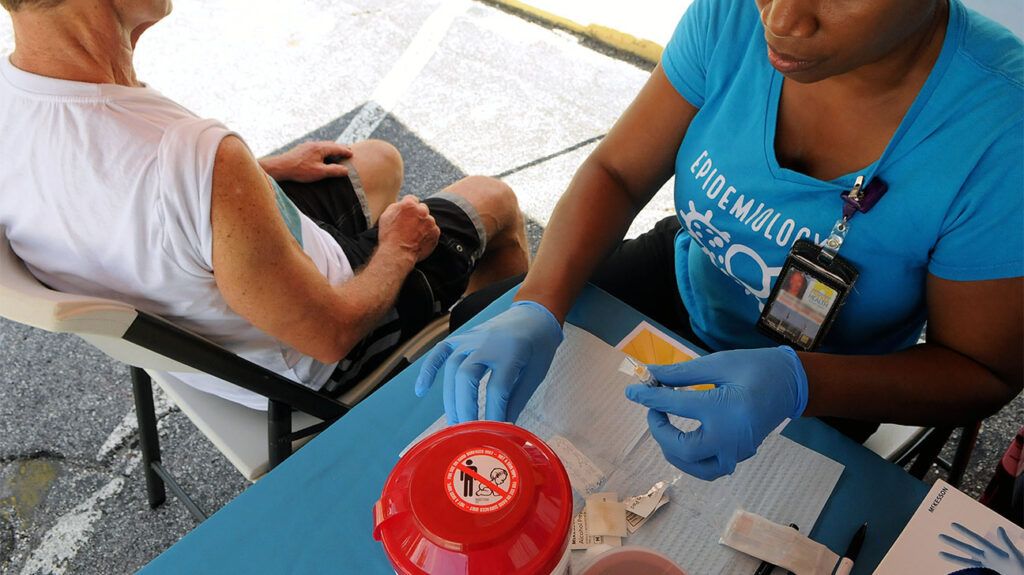A person cannot contract hepatitis A more than once. Once someone has contracted hepatitis A, their body makes antibodies that provide lifelong protection against the virus.
Hepatitis A is a liver infection that occurs due to the hepatitis A virus.
This article looks at immunity against hepatitis A, symptoms, prevention, vaccines, and treatment for the virus.

According to the
This is because the body develops immunoglobulin G antibodies in the early stages of the infection. These antibodies then provide lifelong protection against the hepatitis A virus.
Hepatitis A is not a long-term infection. According to the
The National Foundation of Infectious Diseases notes that symptoms usually go away within 2 months, but they can relapse for up to 6 months. People will usually recover fully after this.
Once people fully recover from a hepatitis A infection, they will not get a repeat infection.
Hepatitis A primarily spreads via the fecal-oral route. That means it is possible to contract the virus through close, personal contact with a person who has the virus. This could include caring for someone who is ill or via certain sexual contact, such as oral-anal sex.
People can also get hepatitis A from eating food or drink contaminated with the virus. Contamination may occur at any stage, such as growing, harvesting, processing, or cooking.
There is no set treatment for hepatitis A, and people will recover over time. Recovery may be slow and could take several
While recovering, people will need to avoid taking unnecessary medications that can negatively affect the liver, such as paracetamol or medications containing acetaminophen. Medical professionals also recommend avoiding alcohol.
To help treat hepatitis A symptoms, people can try to get enough rest, eat a nutritious diet, and drink plenty of fluids to stay well-hydrated.
If people have severe symptoms, they will need to contact a doctor and
Getting the full course of the hepatitis A vaccine is the
Other ways to help prevent hepatitis A include:
- practicing appropriate hygiene and regular handwashing
- washing the hands after using the bathroom and after changing diapers
- washing the hands before food preparation and eating
The hepatitis A vaccine schedule consists of two doses of the vaccine at least 6 months apart.
Children can begin the vaccine schedule once they are 12 months or older. Adults can receive the vaccine at any time they require it.
The following are answers to common questions about hepatitis A.
Is a person immune to hepatitis A after having it?
Yes, a person is immune to hepatitis A after they have recovered from the infection. When someone contracts the virus, the body produces antibodies called immunoglobulin G, which fight the virus.
Once a person has these antibodies, their body has lifelong immunity to the hepatitis A virus and will not get a repeat infection.
For how long is hepatitis A contagious?
Hepatitis A is highly contagious.
Generally, people can pass on the virus to others for up to 2 weeks before any symptoms of the infection appear. A person can pass the virus on to others for 1 week after symptoms first appear. However, this time may vary.
Once a person no longer has symptoms, they may be able to return to school or work but will need to continue taking care to wash their hands thoroughly after using the bathroom.
Symptoms of hepatitis A can include:
- jaundice, which involves a yellowing of the skin and eyes
- loss of appetite
- stomach upset
- diarrhea
- vomiting
- stomach pain
- fever
- dark urine
- light-colored stools
- joint pain
- fatigue
Some people may not develop symptoms of hepatitis A. Symptoms are
The hepatitis A virus causes hepatitis A, which is a liver infection.
It is only possible for people to get hepatitis A once. This is because the body produces antibodies when a person has the virus, resulting in lifelong protection against getting the infection again.
The hepatitis A vaccine is the best form of protection against hepatitis A. Individuals also need to wash their hands before and after preparing and eating food, using the bathroom, or changing diapers.
